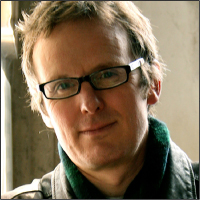Dr. Martin Stokes
// Author, Musician & OrganistDR. MARTIN STOKES is an author, musician, organist, qanun player, and lecturer in Ethnomusicology at the University of Oxford, England. His book “Ethnicity, Identity And Music: The Musical Construction Of Place” (1997) is available from Berg Publishers, and “Celtic Modern: Music At The Global Fringe” (2003) is available from The Scarecrow Press, Inc. Dr. Martin Stokes has written widely on Middle Eastern music, taught at the Queen’s University of Belfast, and the University of Chicago where he was Director of the Center for Middle Eastern Studies, before returning to Oxford University in 2007.
Website: www.ox.ac.uk
Photo: Catriona Stokes
Interview:
I first learned music in a church music school. Music was always about liturgy, and daily devotions in a cavernous and usually entirely empty church, deep in the heart of the countryside in the west of England. It was an excellent way to learn music. The broader system of which this school was a part continues to produce a significant proportion of England’s professional performers, music teachers, musicologists. Twice daily practice for services instilled in me basic musical disciplines and an unselfconscious attitude towards performance. It also instilled in me basic spiritual disciplines. These are harder to define, but for me they have generally been bound up with getting things right, listening to and singing with others, collectively producing something beautiful in sound, and experiencing its reverberations in space. It has never occurred to me that music might lack spiritual significance, which makes it very difficult for me to say exactly what I think that significance is.
Academic musicology of a certain kind inhabits a self-consciously secular universe in which repressed religious habits of thought return in complicated ways: the concert hall as church, Beethoven, Bach, Wagner, or Schoenberg as priest, passive listener as devotee, romantic aesthetics as creed. In the years that followed I was thoroughly schooled in this way of thought. Eventually I rejected it, learning Turkish and then Arabic, traveling in the Middle East, finally becoming an ethnomusicologist with a particular interest in this part of the world. We all end up, I believe, a complicated mixture of what we have rejected in our upbringing, and what we have striven to become, or return to. Generally speaking, though, I am sure that my sense of how music works in society and culture owes more to my earlier religious musical training than my later secular musical training.
So my reply to the question on the spiritual significance of music has an academic ring to it. But it is, nonetheless, a deeply felt response. French sociologist, Émile Durkheim stated in “The Elementary Forms Of Religious Life” (2008, Oxford University Press, USA) that religion was where and how society recognized itself. We need religion, he argued, to remind ourselves how the social functions, and bind ourselves to it emotionally. I believe something of the same might be said about music. In music, we come to understand something important about how we operate as social beings, how we balance collectivity and designated fragments of that collectivity in our society, how we connect a sense of the past with hope for the future, how we reconcile revelation and reason, and, ultimately, how we reconcile the inevitability of a solitary death with our deepest instincts as social beings who create and share. Such issues work their way through different societies in different ways; through music they shape something we might recognize in many as “spiritual”.
“In music, we come to understand something important about how we operate as social beings.”
– Dr. Martin Stokes, editor of “Ethnicity, Identity And Music: The Musical Construction Of Place”


